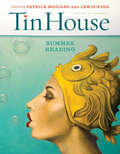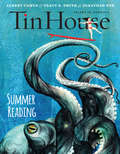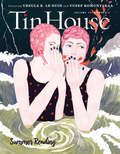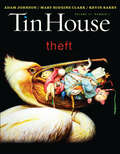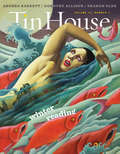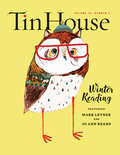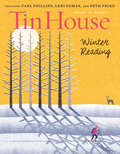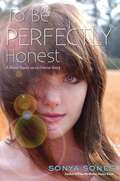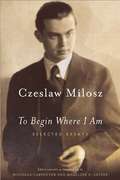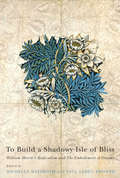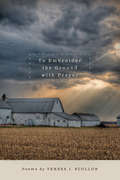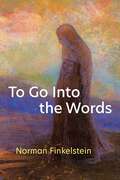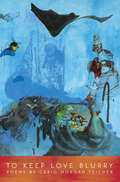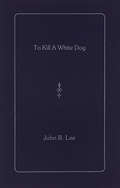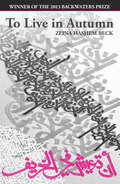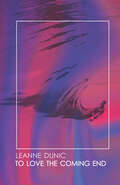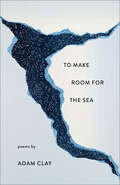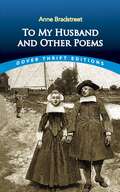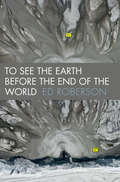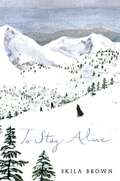- Table View
- List View
Tin House: Summer Reading (Tin House Magazine #Volume 16 Number 4)
by Rob Spillman Win McCormack Holly MacArthur<P> Tin House's Summer Reading brings you all the things you've come to expect from the acclaimed literary journal. Packed with thrilling fiction, introspective essays, and artful poetry, this issue is perfect company for an afternoon in the shade. <P> Summer Reading 2015 features previously untranslated work from 2014 Nobel Prize winner Patrick Modiano on Paris and a timely essay from Lewis Hyde revisiting the 1964 murder of two young black men in Mississippi. In addition to these works by established authors, this issue also presents work from five New Voices in fiction, nonfiction, and poetry. Featuring fiction from: Jodi Angel, Smith Henderson, Greg Hrbek, Tara Ison, Patrick Modiano, Matthew Socia, and Sarah Elaine Smith Poetry by: Catherine Barnett, Cody Carvel, Diana M. Chien, Rita Gabis, Robert Duncan Gray, Kimiko Hahn, Ed Skoog, and Jenny Xie Nonfiction by: Mary Barnett, David Gessner, and Lewis Hyde Lost & Found: S. Shankar on Agnes Smedley, John Reed on André Gide, Jessica Handler on Berton Roueché, Jonathan Russell Clark on H.D., and Rachel Riederer on Barbara Grizzuti Harrison.
Tin House: Summer Reading 2017 (Tin House Magazine #0)
by Rob Spillman Win McCormack Holly MacArthurAn award-winning quarterly, Tin House started in 1999, the singular love child of an eclectic literary journal and a beautiful glossy magazine. Drop it in your beach bag with the sunscreen and kadima paddles—our annual summer reading issue will feature a smorgasbord of new writing from established and new voices.
Tin House: Summer Reading 2018
by Rob Spillman Win McCormack Holly MacArthurThrow on your sunglasses and prop up the parasol, Tin House is back with another Summer Reading edition. Enjoy the hottest new fiction, shine some light with uniquely personal nonfiction, and then cool off in the shade with the poets.
Tin House: Theft (Tin House Magazine)
by Rob Spillman Win Mccormack Holly MacarthurTin House's Theft Issue spends some time in the larcenous land of literature with stolen stories, embezzled essays, and pick-pocketed poetry. "Talent borrows, genius steals" is usually attributed to Oscar Wilde, and occasionally Pablo Picasso. There is, however, no record of either one actually saying or writing this. T. S. Eliot, on the other hand, wrote, "Immature poets imitate; mature poets steal; bad poets deface what they take, and good poets make it into something better, or at least something different." Theft and appropriation have always been artistic engines, and in this issue of Tin House, those engines run hot . . . Featuring new work from Laura Lippman, Kevin Young, Mary Ruefle, George Singleton, Victor LaValle, Alissa Nutting, and more.
Tin House: Winter Reading (2015) (Tin House Magazine)
by Rob Spillman Win Mccormack Holly MacarthurTin House brings you all the things you've come to expect from the acclaimed literary journal. Packed with wintery fiction, introspective essays, and artful poetry, this issue is perfect company for an afternoon in the shade. The best company on a cold night is hot new fiction, poems, essays, and interviews. Warm up with Tin House this winter. Fiction by Dorothy Allison, Patrick deWitt, Helen Phillips, Martha McPhee, Drew Ciccolo, James Scudamore, and Andrea Barrett Poetry by Sharon Olds, Caroline Knox, Adam Fitzgerald, Cornelius Eady, Caroline O'Connor Thomas, and Timmy Straw Features by Claire Vaye Watkins, Evie Wyld & Joe Sumner, Rachel Jamison Webster, CJ Hauser, and John Fischer Lost & Founds by Carrie Brown, James Guida, Pamela Erens, Scott F. Parker, and Carol Keeley
Tin House: Winter Reading 2016 (Tin House Magazine)
by Rob Spillman Win Mccormack Holly MacarthurThe Winter 2016 issue of Tin House features new fiction, essays, and poetry from longtime favorites and new voices. The Winter 2016 issue of Tin House features new fiction, essays, and poetry from longtime favorites and new voices. Thaw your icy heart with Tin House this Winter. Pour a mug of hot cocoa and cozy up with new fiction, essays, and poetry from fireside favorites and discover New Voices for the new year.
Tin House: Winter Reading 2017 (Tin House Magazine #0)
by Rob Spillman Win McCormack Holly MacArthurTin House 74: Winter Reading offers the best of both New Voices and established favorites in fiction, nonfiction, and poetry. Featuring fiction, nonfiction, and poetry from established writers and new voices, Issue 74 will keep you warm on a cold night.
Tinke Tinke
by Elsa BornemannTinke-Tinke es un maravilloso libro de poemas que, gracias a su métrica breve y su rima sencilla y pegadiza resultan ideales para chicos que comienzan la escolaridad. La mayoría de sus poemas son muy conocidos por el medio docente y tienen la virtud de desarrollar personajes y situaciones sumamente representativos de la vida cotidiana infantil.
Tirukkovaiyar (aka Tiruchitrambalakkovaiyar)
by ManikkavachakarAs a staunch devotee of Lord Shiva, Manikkavachakar in 25 chapters containing 400 verses visualize the state of happiness of life in 25 stages and emphasizes that the life attains complete happiness in mixing and mingling with Lord Shiva.
To Be Perfectly Honest: A Novel Based on an Untrue Story
by Sonya SonesCan honesty lead to heartbreak if the truth is subjective? A compelling novel in verse from Sonya Sones. <p><p>Fifteen-year-old Colette is addicted to lying. Her shrink says this is because she’s got a very bad case of Daughter-of-a-famous-movie-star Disorder—so she lies to escape out from under her mother’s massive shadow. But Colette doesn’t see it that way. She says she lies because it’s the most fun she can have with her clothes on. Not that she’s had that much fun with her clothes off. At least not yet, anyway… <p><p>When her mother drags her away from Hollywood to spend the entire summer on location in a boring little town in the middle of nowhere, Colette is less than thrilled. But then she meets a sexy biker named Connor. He’s older, gorgeous, funny, and totally into her. So what if she lies to him about her age, and about who her mother is? I mean, she has to keep her mother’s identity a secret from him. If he finds out who she really is, he’ll forget all about Colette, and start panting and drooling and asking her for her mother’s autograph. Just like everyone always does.
To Bedlam and Part Way Back
by Anne SextonThis book of poems has the cumulative impact of a good novel. It has the richness variety and compactness of true poetry. It is a book to read and remembered. Sexton is an accomplished lyricist. She can combine the straightforwardness of playing on his speech with the saddle with the control, tight formal structure, and brilliantly effective imagery. But she makes her singular claim on our attention by the fact that she has important things to tell us and tells them dramatically.
To Begin Where I Am: Selected Essays
by Czeslaw Milosz Madeline Levine Bogdana CarpenterThe selection of essays in this book was guided by a desire to represent Milosz's extraordinary thematic breadth as well as the diversity of the genres and styles he commands. The essays are grouped into three sections. Part I, "These Guests of Mine," introduces Milosz through autobiographical accounts and biographical sketches of people who were representative of the historical currents that shaped his life. Part II, "On the Side of Man," presents Milosz as the profoundly serious religious thinker he has always been. Part III, "Against Incomprehensible Poetry," gathers together Milosz's most significant writings on the obligations of poetry and concludes with his assessments of four major poets of the twentieth century.
To Build a Shadowy Isle of Bliss: William Morris's Radicalism and the Embodiment of Dreams
by Paul Leduc Browne Michelle WeinrothTo Build a Shadowy Isle of Bliss casts new light on the political radicalism and social thought of nineteenth-century artist, author, and revolutionary, William Morris. Standing on the cusp of a new wave of scholarship, this book presents an exciting convergence of views among internationally renowned scholars in the field of Victorian Studies. Balancing variety and unity, this collection reappraises Morris’s concept of social change and asks how we might think beyond the institutions and epistemologies of our time. Though the political significance of Morris’s creative work is often underestimated, the essays in this volume showcase its subtlety and sophistication. Each chapter discerns the power and novelty of Morris’s radicalism within his aesthetic creations and demonstrates how his most compelling political ideas bloomed wherever his dexterous hand had been at work - in wallpapers, floral borders, medievalist romances, and verse. Morris's theory and practice of aesthetic creation can be seen as the crucible of his entire philosophy of social change. In situating Morris's radicalism at the heart of his creative legacy, and in reanimating debates about nineteenth-century art and politics, To Build a Shadowy Isle of Bliss challenges and expands received notions of the radical, the aesthetic, and the political.
To Embroider the Ground with Prayer
by Teresa J. ScollonA beautiful meditation on grief, memory, and the seasons of life.
To Go Into the Words (Poets On Poetry)
by Norman FinkelsteinTo Go Into the Words is the latest book of critical prose from renowned poet and scholar of Jewish literature Norman Finkelstein. Through a rigorous examination of poets such as William Bronk, Helen Adam, and Nathaniel Mackey, the book engages the contemporary poetic fascination with transcendence through the radical delight with language. By opening up a given poem, Finkelstein seeks the “gnosis” or insight of what it contains so that other readers can understand and appreciate the works even more. Pulling from Finkelstein’s experience of writing thirteen books of poetry and six books of literary criticism, To Go Into the Words consistently rewards the reader with insights as transformative as they are well-considered and deftly mapped out. This volume opens the world of poetry to poets, scholars, and readers by showcasing “the gnosis that is to be found in modern poetry.”
To Keep Love Blurry
by Craig Morgan TeicherTo Keep Love Blurry is about the charged and troubled spaces between intimately connected people: husbands and wives, parents and children, writers and readers. These poems include sonnets, villanelles, and long poems, as well as two poetic prose pieces, tracing how a son becomes a husband and then a father. Robert Lowell is a constant figure throughout the book, which borrows its four-part structure from that poet's seminal Life Studies. Craig Morgan Teicher won the Colorado Prize for Poetry. He is poetry reviews editor for Publishers Weekly magazine and served as vice president on the board of the National Book Critics Circle.
To Keep Love Blurry (American Poets Continuum #135.00)
by Craig Morgan TeicherTo Keep Love Blurry is about the charged and troubled spaces between intimately connected people: husbands and wives, parents and children, writers and readers. These poems include sonnets, villanelles, and long poems, as well as two poetic prose pieces, tracing how a son becomes a husband and then a father. Robert Lowell is a constant figure throughout the book, which borrows its four-part structure from that poet's seminal Life Studies. Craig Morgan Teicher won the Colorado Prize for Poetry. He is poetry reviews editor for Publishers Weekly magazine and served as vice president on the board of the National Book Critics Circle.
To Kill a White Dog
by John B. LeeA long poem dramatizing the clash in visions of the land which occurs when a white settler builds on a sacred Iroquois site.
To Live in Autumn (The Backwaters Prize in Poetry)
by Zeina Hashem Beck"Zeina Hashem Beck crafts a multifaceted portrait of the people and the streets of Beirut. Part love-letter, part elegy, Hashem Beck's debut collection keeps the city from becoming 'a shadow of a memory, / the memory of a shadow' for poet and reader both, offering us instead 'labyrinths / in which we get lost on purpose.' This collection is as vibrant and sensitive as its subject—the city that 'understands / not being tired of being.' Join me in an enthusiastic welcome for a compelling new voice in Anglophone poetry."—John Hennessy
To Love The Coming End
by Leanne DunicIn To Love the Coming End, a disillusioned author obsessed with natural disasters and 'the curse of 11' reflects on their own personal earthquake: the loss of a loved one. A lyric travelogue that moves between Singapore, Canada, and Japan, this debut from Leanne Dunic captures what it's like to be united while simultaneously separated from the global experience of trauma, history, and loss that colour our everyday lives.
To Make Room for the Sea: Poems
by Adam Clay&“The more I sit with these poems, the more they resonate with me and with universal patterns and themes—existential inquiries, loneliness, spiritual doubts.&” —Green Mountains ReviewTo Make Room for the Sea reckons with the notion that nothing in this world is permanent. Led by an introspective speaker, these poems examine a landscape that resists full focus, and conclude that &“it&’s easier to love what we don&’t know.&” &“I hold this leaf I think / you should see, but I can&’t quite / say why,&” Adam Clay writes, as he navigates a variety of both personal and ecological fixations: disembodied bullfrog croaks, the growth of his child, a computer&’s dreaded blue screen of death. The observations in To Make Room for the Sea convey both grief for the Anthropocene and hope for the future. The poems read like field notes from someone who knows the world and hopes to know it differently. On the precipice of great change and restructured perspective, Clay&’s poems linger in &“the second between taking in a vision and processing it,&” in the moment when the world is less a familiar system and more a palette of colors and potential.To Make Room for the Sea delights as much as it mourns. It looks forward as much as it reflects. Deft and hopeful, the poems in this collection gently encourage us to take another look at a world &“only some strange god might have thought up / in a drunken stumble.&” &“That&’s the magic of this book—the way Adam Clay, line after line, enacts the mind on the page.&” —Maggie Smith &“Draws from an impressive repertoire of forms to tease out complex questions regarding time, epistemology, and memory.&” —Publishers Weekly
To My Husband and Other Poems (Dover Thrift Editions: Poetry)
by Robert Hutchinson Anne BradstreetFrom America's first poet -- a splendid selection of poems encompassing everything from lyric verses addressed to her husband and children to somber epitaphs on the deaths of her mother, father, and grandchildren. Poems grouped according to category (love, home life, religious meditations, dialogues, and lamentations). Of great literary value, these works also shed light on the cares, concerns and roles of colonial women.
To School Through The Fields
by Alice TaylorThrough the fields and in the cottages round about is where we view Alice Taylor's childhood in County Cork, Ireland. This gentle, witty memoir is told to the rhythms of nature and farm life as it cycles through the years. Reading it is like taking a vacation and better than any field trip you took to a farm. When the family slaughters a couple of hogs, all of the neighbours help and they all share in the meat. You'll see how it is processed from carcass to plate. You'll discover why Alice loves her quirky neighbours but isn't as fond of nuns. Sweating and happy, farmhands and children alike harvest the hay with the aid of a tumbling paddy, a huge comb like contraption made of wood. They wash off the sweat, hayseeds and insects in an icy refreshing stream. Then there's cold tea and apple cake to fortify them for another round of work. Alice's mother notices the best in everyone and oversees the daily recitation of the rosary. Her father is comforted more by the richness of life in his crops and farm animals. The children play freely outside not missing or needing toys. There are tragedies like the death of Alice's little brother, but most of Alice's memories of a time that is now lost to us, brim with joy humor and love.
To See the Earth Before the End of the World (Wesleyan Poetry Series)
by Ed RobersonIn To See the Earth Before the End of the World Ed Roberson presents us with 120 new poems, each speaking in his unique voice and seen through his unique eye. Earth and sky, neighborhood life and ancient myths, the art of seeing and the architecture of the imagination are all among the subjects of these poems. Recurring images and ideas construct a complex picture of our world, ourselves, and the manifold connections tying them together. The poems raise large questions about the natural world and our place in it, and they do not flinch from facing up to those questions. Roberson's poems range widely through different scales of time and space, invoking along the way history and myth, galaxies and garbage trucks, teapots and the history of photography, mating cranes and Chicago's political machine. This collection is composed of five sequences, each developing a particular constellation of images and ideas related to the vision of the whole. Various journeys become one journey--an epic journey, invoking epic themes. There are songs of creation, pictures of the sorrows of war, celebrations of human labor and human society, a respect for tools and domestic utensils that are well made, the deep background of the past tingeing the colors of the present, and the tragic tones of endings and laments, a pervading awareness of the tears in things. Most of all, there is the exhilaration of a grand, sweeping vision that enlarges our world.
To Stay Alive: Mary Ann Graves And The Tragic Journey Of The Donner Party
by Skila BrownTold in riveting, keenly observed poetry, a moving first-person narrative as experienced by a young survivor of the tragic Donner Party of 1846.<P><P> The journey west by wagon train promises to be long and arduous for nineteen-year-old Mary Ann Graves and her parents and eight siblings. Yet she is hopeful about their new life in California: freedom from the demands of family, maybe some romance, better opportunities for all. But when winter comes early to the Sierra Nevada and their group gets a late start, the Graves family, traveling alongside the Donner and Reed parties, must endure one of the most harrowing and storied journeys in American history. Amid the pain of loss and the constant threat of death from starvation or cold, Mary Ann’s is a narrative, told beautifully in verse, of a girl learning what it means to be part of a family, to make sacrifices for those we love, and above all to persevere.
